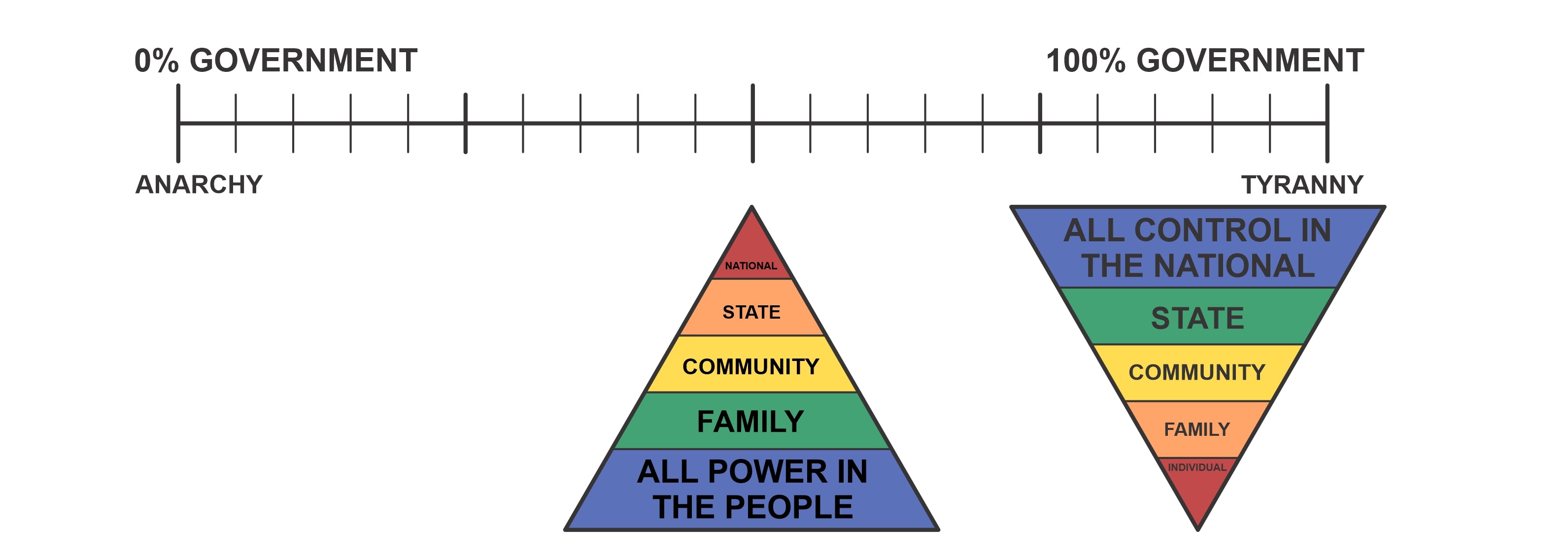 Listen to the audio
Listen to the audio
Federalism is widely regarded as one of America's most valuable contributions to political science, but few people understand why. James Wilson observed that “Governments, in general, have been the result of force, of fraud, and of accident”. As far as he could tell, history lacked any real evidence to suggest that it ever had been otherwise until the founding era. For the first time in history, men assembled voluntarily, “deliberating fully, and deciding calmly, concerning that system of government under which they would wish that they and their posterity should live.”
Their calm deliberations not only created a national head with three separate but coordinated departments, but as James Madison said, it retained the “states which are also strong – separate states but a united people.” He referred to it as “neither man nor horse but, like the centaur, half of each.” This new creature, created through the elected representatives of the people, was nothing like the world had ever seen.
The Constitutional structure of the national government was never intended to destroy or weaken the state and local governments. These separate and distinct states, which were created through the will of the people, intentionally banned together and created a national head with limited and defined powers. They called this new creature Federalism.
What is Federalism?
The word ‘federal’ is derived from the Latin word ‘foedus’ which means a covenant, treaty, league, or alliance. This term was not widely used before the founding era and was adopted to describe the new type of government they created. Today federalism is defined as a form of government in which power is distributed between a central authority and a number of constituent territorial units.
The different levels of government within our federal system are the national, state, county, town or city, and family or individual. Technically speaking, the term “federal government” refers to the entire system with properly assigned powers to the various levels of government. As the powers of government have gradually concentrated in Washington D. C., the term “federal government” has come to mean that level associated with the national branches of government. The Founders used the terms “national” or “general” most often when referring to the government of the nation, but even they, occasionally, used the term “federal” in their writings when referring to the national as a matter of convenience. More important than the terms we use to describe our government are the principles that should be understood so that problem-solving can happen at the level most adept to handle them.
The Principles of Federalism
One of the most powerful examples that supports the principle of federalism can be found in the Constitution itself. Because the States were concerned that the national government would overstep its bounds, they included these words in the Bill of Rights.
“The powers not delegated to the United States by the Constitution, nor prohibited by it to the States, are reserved to the States respectively, or to the people.” (Amendment 10)
Before the states ratified the first 10 amendments, James Madison emphasized this principle in Federalist 45.
“The powers delegated by the proposed Constitution to the Federal Government, are few and defined. Those which are to remain in the State Governments are numerous and indefinite. The former will be exercised principally on external objects, as war, peace, negotiation, and foreign commerce …. The powers reserved to the several States will extend to all the objects, which, in the ordinary course of affairs, concern the lives, liberties and properties of the people; and the internal order, improvement, and prosperity of the State.”
Since all government control is power derived from the people, there is no legitimate control in any level of government except what the people delegate to it. The Founders’ formula was structured so that the farther the level of government was from the people, the fewer and more defined its powers should be. This simple concept can be illustrated with a pyramid, the bottom of which represents individuals and families. Above that are communities, towns, cities, counties and states. The national government is represented at the top of the pyramid. James Wilson described it as such:
“A free government has often been compared to a pyramid. This allusion is made with peculiar propriety in the system before you; it is laid on the broad basis of the people; its powers gradually rise, while they are confined, in proportion as they ascend, until they end in that most permanent of all forms. When you examine all its parts, they will invariably be found to preserve that essential mark of free governments—a chain of connection with the people.”
You will notice that the higher a governing body is on the pyramid, the fewer problem-solving responsibilities it should have. In a society where we value freedom and self-governance, individuals and families should be responsible for solving most of their problems.

Unfortunately, what we have today is an upside-down pyramid where most of the problem solving now happens on the national level and the people take little interest in solving their own problems. Thus, we continue to move more toward a Socialist society where the national government is looked upon as the great problem solver.

Thomas Jefferson expressed the importance of dividing government control in this pyramid structure when he said:
“The way to have good and safe government, is not to trust it all to one, but to divide it among the many, distributing to everyone exactly the functions he is competent to. Let the national government be entrusted with the defense of the nation, and its foreign and federal relations; the State governments with the civil rights, laws, police, and administration of what concerns the State generally; the counties with the local concerns of the counties, and each ward direct the interests within itself. It is by dividing and subdividing these republics from the great national one down through all its subordinations, until it ends in the administration of every man's farm by himself; by placing under everyone what his own eye may superintend, that all will be done for the best. What has destroyed liberty and the rights of man in every government which has ever existed under the sun? The generalizing and concentrating all cares and power into one body.”
Lacking a commitment to true federalism fosters the temptation to shift the responsibility of problem solving to someone else. The people start losing their foundational position on the pyramid of self-governance and feel less accountable for their personal actions and less duty bound to help their neighbor. Government will take care of the problem, they say.
Misunderstanding the principle of federalism in our society has literally flipped the problem-solving pyramid upside down. It is easy to ignore problems or think it is someone else’s problem. This is the mindset of a hired hand.
We are recipients of the greatest political system in the world! We still have more freedom than most of the people in the world. Let’s own it and solve our own problems instead of continuing to give our freedom away by allowing government to solve our problems for us.




5 comments
Dick Shaughnessy
Reclaiming the power will take extraordinary effort, but what’s more important to an individual than his liberty. It’s time to ROAR: Reclaim our American Republic.
Charles Kiesewetter
The further the government has “evolved” from the original concept – the less freedom the citizens have and more is taken by the folks in Washington DC. It surprises me that the states -no longer stand up to this federal abuse of power. Every day we hear from the liberals and the left that the US Constitution is not working and needs to be changed. That is the reason it does not work – since Woodrow Wilson thru FDR, LBJ, Obama and now during the Biden regime of terror – the very idea of freedom is in the hands of others – not the people.
David McCuistion
This is exactly how it is laid out in the book 5000 Year Leap. I recommend it to everyone. The people need to do their part to make sure it works. Until that happens, Tyranny will prevail and lead to Socialism, which always leads to Communism.
Rodrigo Silveira
This is a very cogent and crisp explanation of the Federalism our Founding Generation endowed us. It puzzles me that we allow our national government violate it at all daily
Nan Nicoll
As a Precinct Captain and student of our US Constitution and Arizona Constitution We the People have been blessed with a system that will keep tyranny at bay. Every situation that need a solution from government in our counties and cities should be solved using local government. This is the government closet to us and it is our duty to be involved.